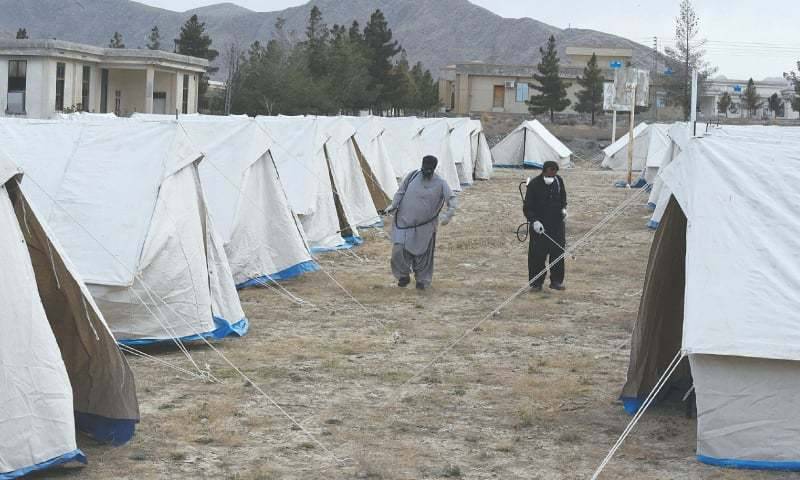The disinfection of Taftan is underway, with all local residents set to be screened. The decision has been taken by the local authorities, who are also working to ensure that Pakistanis stuck in Iran can safe return home.
The Taftan border has turned out to be the biggest source of the spread of COVID-19 in Pakistan. At the time of writing, a vast majority of the coronavirus cases are linked to Iran.
“[More than half of the] cases were reported in persons who had traveled to Iran. 191 persons who were found positive for COVID-19 had traveled to different countries other than Iran. We have reduced the pace of cases due to effective steps of social distancing but all those successes can be ruined if people ignore social distancing,” said Special Assistant to the Prime Minister on Health Dr Zafar Mirza.
However, the PM’s health advisor further revealed that now almost a third of the COVID-19 cases are locally spread. Observers have pointed fingers towards the mismanagement at the Taftan border as a major cause for the spread.
Those who were quarantined at the Taftan camp have revealed that they weren’t screened properly or given the needed treatment. Videos from the quarantine camps have further revealed the unhygienic conditions in which hundreds were camped for weeks.
With two new cases on Tuesday, the tally for the confirmed coronavirus cases in Balochistan rose to 154.
“Five [of the 154] were locally transmitted, and the other patients had travel history. A total of 1,854 people have been tested in the province so far,” said Balochistan Government Spokesperson Liaquat Shahwani.
Observers feel that the negligence at the Taftan border, which is the root of the spread of the infection in Balochistan, and also to other parts of the country, is owing to a long history of the marginalisation of the province.
With local authorities long complaining about a lack of basic healthcare facilities, the fact that the province couldn’t cope with what has since become a pandemic is understandable.
Meanwhile, fingers have also been pointed to the Prime Minister’s Special Assistant on Overseas Pakistanis ZulfikarBukhari.
“Students weren’t brought from China, but the Taftan border was flooded by people [reentering Pakistan amidst the coronavirus pandemic]. It was Zulfi Bukhari [who] allowed the visitors to come,” said senior leader of the Pakistan Muslim League-Nawaz (PML-N) Khawaja Asif.
PM’s Special Assistant Bukhari has rubbished these allegations and has since sent a Rs1 billion defamation notice to Asif.
“No influence was used by me or any other [Pakistan Tehrik-e-Insaf] leader to allow anyone on Taftan border – which isn’t even under federal control. There’s a time and place for yellow journalism antics and this isn’t one,” maintained Bukhari.
Even so, the federal government has been under severe pressure owing to what many feel is inaction over the spread of coronavirus. The Balochistan government too has received backlash, while insiders maintain that limited resources have bogged them down.
Meanwhile, inquiry over the Taftan episode is still being sought. Opposition parties and critics of the government still argue that it failed to “do enough” in terms of quarantining the pilgrims, maintaining that the makeshift facility established in Taftan was inadequate.
A petition seeking inquiry into potential failures at Taftan was filed in the Islamabad High Court (IHC). On Monday, IHC Chief Justice Athar Minallah turned down the plea in his three-page notice, maintaining that “this is not the time to suspect the intentions of the state and get involved in differences.”
However, for many locals, a difference has existed for far too long in the centre’s treatment of Balochistan.






